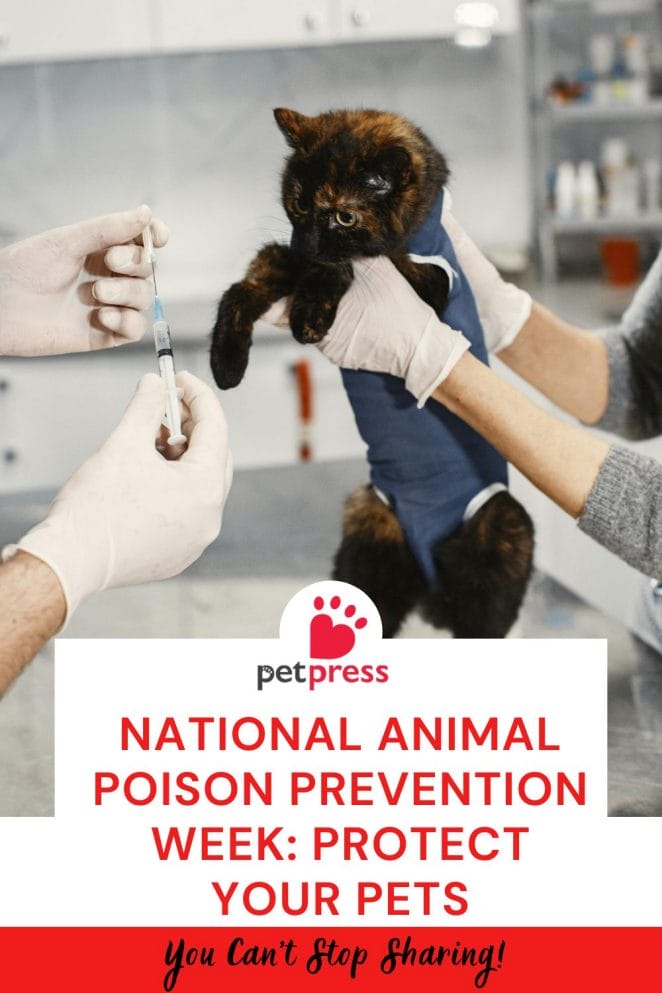
National Animal Poison Prevention Week is held in the third week of March. Its main aim is to help pet owners understand what substances can harm their pets, recognize the signs of poisoning, and learn how to keep their pets safe.
This week is associated with National Poison Prevention Week.
It’s important to highlight the dangers of poisonous materials to pets, especially during springtime when plants, herbicides, fertilizers, and pesticides are commonly used.
About National Animal Poison Prevention Week
Every year, National Animal Poison Prevention Week coincides with National Poison Prevention Week, which the National Safety Council first introduced in 1961.
The National Safety Council quickly expanded its awareness campaign to include protecting not only human families but also our beloved pets and livestock.
Unfortunately, in 2021, the ASPCA’s American Poison Control Center (APCC) had to assist in a staggering 401,550 cases of animal poisoning.
Additionally, the Pet Poison Helpline, serving the US, Canada, and the Caribbean, experienced a 51% increase in call volumes from 2020 to 2021.
Experts attribute this rise in cases to the pandemic, which led to a surge in new pet ownership and more at-home activities like painting and baking.
These statistics underscore the crucial need to educate the public about pet poisoning, emphasizing the significance of programs like National Animal Poison Prevention Week.
Toxic Elements to Keep Away from Pets
Here’s a simplified version of the common household items toxic to pets:
Xylitol
Found in sugar-free gum and candies, xylitol is toxic to dogs. Even small amounts can cause low blood sugar or liver failure, leading to symptoms like vomiting, weakness, and seizures.
Human Medications
NSAIDs like Advil, acetaminophen (Tylenol®), and antidepressants can be harmful to pets.
NSAIDs may cause stomach ulcers and kidney failure, while acetaminophen can damage red blood cells in cats and lead to liver failure in dogs.
Antidepressants can cause neurological issues such as sedation and seizures.
Flowers
Certain flowers like lilies (tiger, day, Asiatic, Easter, Japanese) are highly toxic to cats, causing severe kidney failure.
Ingesting spring bulbs like daffodils and tulips can lead to vomiting, diarrhoea, and even heart or respiratory issues.
Chocolate
Dark and baker’s chocolate contain toxic substances like methylxanthines, which can cause vomiting, diarrhoea, hyperactivity, abnormal heart rhythm, seizures, and death in pets.
Fertilizers
Some fertilizers contain dangerous chemicals like organophosphates or carbamates, which can cause drooling, seizures, difficulty breathing, and even death in pets.
Pest Control Products:
Rodent, snail, and slug baits can be fatal if ingested by pets.
Rodent baits may lead to blood clotting disorders or kidney failure, while snail and slug baits can cause severe tremors or seizures. Immediate veterinary attention is crucial if ingested.
Tips For Preventing Pet Poisoning at Home
The number of potential dangers for pets in your home can be overwhelming, but as a pet parent, you can take steps to keep your furry friend safe.
Begin by identifying potential hazards and keeping them out of reach.
Store all cleaning products in a locked cupboard or closet.
If you have open shelves, place hazardous items high up where pets can’t reach them.
Similarly, keep automotive products in the garage and store them securely.
Taking these precautions can help prevent accidental poisoning and keep your pet safe.
Following these tips can greatly reduce the chances of your pet getting poisoned:
- Check Houseplants: Before buying new plants, use your phone to research if they are safe for pets. Avoid getting plants that could be toxic.
If you already have toxic plants, either get rid of them or put them out of reach on high shelves. - Stay Present in the Kitchen: When cooking or baking, never leave the kitchen unattended.
Clean up any spills or dropped food promptly to prevent pets from ingesting anything harmful. - Use Doggy Gates: When using potentially toxic materials, like cleaning products or chemicals, use a doggy gate to keep pets away from those areas.
- Ensure Surfaces Are Dry: After cleaning, make sure surfaces are completely dry before allowing pets back into those areas.
This prevents them from licking or ingesting any cleaning chemicals. - Consult Your Veterinarian: Before introducing new substances or treatments into your home, consult your veterinarian.
They can advise you on the safety of these items for your pet, helping to prevent any accidental poisoning incidents.
Final Thoughts
It’s crucial to safeguard your own pets, but National Poison Prevention Week presents a great opportunity to raise awareness.
If you know people with pets, consider sharing what you’ve learned about preventing poisonings and promoting pet insurance as a way to protect their furry friends.
Sharing knowledge can help keep more pets safe and healthy.


GIPHY App Key not set. Please check settings